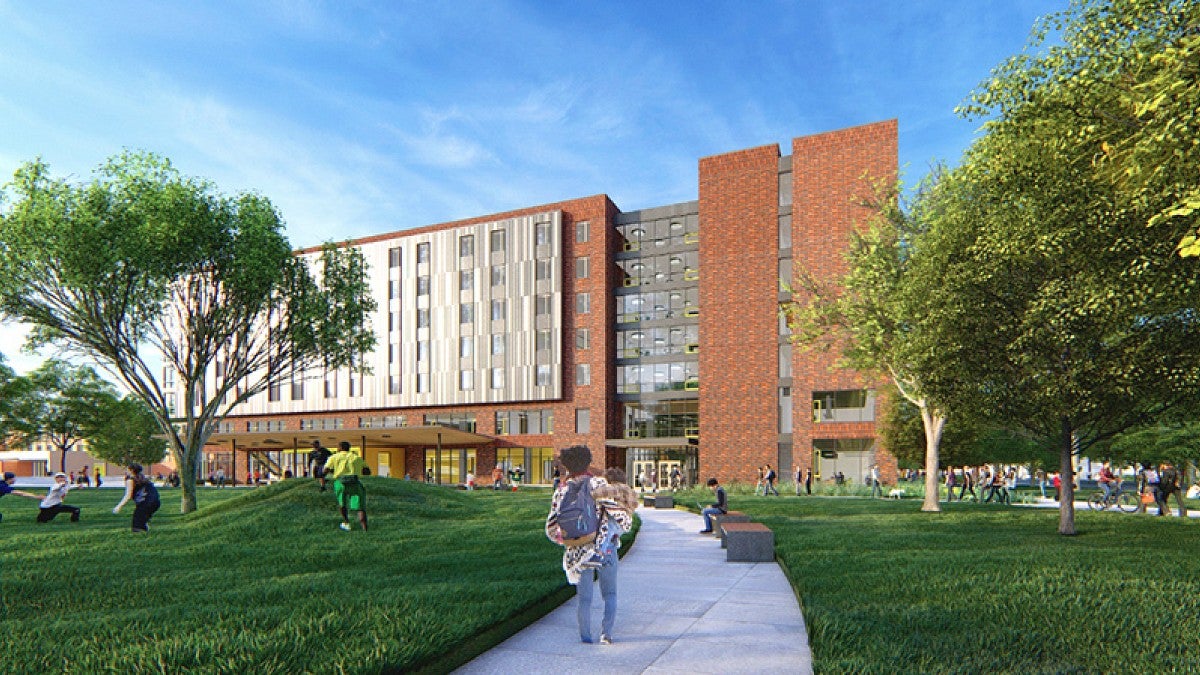The University of Oregon Board of Trustees approved the second and third phases of the Housing Transformation Project and received an update on federal and state legislative affairs for the university at its Feb. 2 meeting.
The three-phase housing project will replace two of the university’s older residence complexes, Hamilton and Walton, with three new buildings with a combined capacity of around 1,800 students.
The project is a key component in the university’s drive to expand student enrollment. The new buildings will include a prospective student recruitment and welcome center, and a reimagined and expanded green space.
The UO broke ground on the project in late 2019 and work is progressing well, Roger Thompson vice president for student services and enrollment management told the trustees. The first new residence hall will be ready for students this fall.
“It’s coming along splendidly,” Thompson said. “It’s on time and on budget.”
The second and third phases of the project involve building two residence halls to replace Walton Hall, and replacing Hamilton Hall with a new green space. The total anticipated cost of those phases is a combined $130 million and will be funded by issuing revenue bonds to be repaid directly from University Housing’s stand-alone budget.
Given the uncertainty of the COVID-19 pandemic, Thompson and UO Housing Director Michael Griffel walked the trustees through various scenarios of occupancy in the residence halls at the start of the 2021-22 academic year and their corresponding financial implications.
Thanks to healthy financial reserves the housing unit has built up, Thompson said that, even in the worst-case occupancy scenarios for next year, the project remains financially prudent.
“Our total reserves never get to a point that is concerning for me, even when we look at the downside scenarios,” he said.
Jamie Moffitt, vice president for finance and administration, noted that UO housing’s finances are hit harder by a down enrollment year than the university overall, but they recover more quickly, due to the fact that the vast majority of students in the residence halls are first-year students.
The trustees voted without dissent to move forward with the final two phases of the project. The project is slated to be complete in summer 2024.
Betsy Boyd, the UO’s associate vice president for federal affairs, and Hans Bernard, associate vice president for state affairs, briefed the trustees on legislative issues and priorities.
Boyd noted that Congress included funding for institutions of higher education in two of the four COVID-19 relief package it approved in 2020.
The combined relief packages of $38 billion provided to all higher education institutions and their students was significantly less than the estimated financial losses of almost $170 billion those schools experienced last year, Boyd said.
“While we are grateful for the support we have received, we know that it is far less than what we have lost and the new costs our students and institutions are facing,” she said.
Boyd said the UO will continue to advocate for additional COVID-19 relief funding and increased financial aid support for students, as well as research appropriations, in 2021.
Bernard, meanwhile, recapped the three special sessions the Oregon Legislature held in 2020, which included several UO priorities receiving support.
Lawmakers approving state funding for renovating Huestis Hall, for the build-out of the UO’s ShakeAlert earthquake early warning system, and to replace the ocean-going research vessel for the UO’s Oregon Institute of Marine Biology.
Looking ahead to the 2021 legislative session, Bernard said the UO is working to secure a $900 million allocation for public universities in the upcoming two-year state budget, which would represent a small increase from the current budget cycle.
Gov. Kate Brown proposed keeping higher education funding flat in her proposed 2021-23 budget late last year, which would represent an effective budget cut for all universities. Oregon lawmakers will debate the state budget over the next five months, based on the state’s updated revenue forecasts.
President Michael Schill said he is hopeful lawmakers will recognize the vital role universities will play in a healthy recovery from the current economic recession.
“Any cut whatsoever in state funding is going to be very difficult for us,” Schill said. “We are seeing the value of research universities right now. It’s research universities that are working with companies to come up with the vaccine. It’s research universities like ours that are working with Lane County Public Health to organize mass vaccination events. It’s research universities like ours that are doing more COVID-19 asymptomatic testing than anyone else.”


